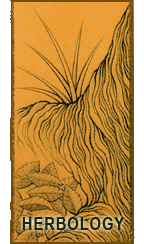The Thick and Thin of TCM Herbs

You probably know that herbs come in a variety of temperatures. There are herbs that are described as very hot, hot, slightly hot, warm, slightly warm, neutral, slightly cool, cool, slightly cold, cold and very cold.
But did you know that herbs can also described as thick and thin?
This isn’t in reference to the shape of the cut of the herbs, but has to do with their thermal nature.
A thick cool herb for instance has a cool property, but it is a slow sustained action whereas a thin cool herb is quick to act, but it doesn’t last very long.
When I learned about this, I couldn’t help but think about something I learned in a meteorology class in college called “thermal capacity” which is the capacity of a substance to maintain its temperature.
I think this can be best described by looking at something with a high thermal capacity (analogous to the thick herbs) and a low thermal capacity (like the thin herbs).
When you boil water and you turn off the heat beneath it, the water remains so hot that if you put your finger into it within the first few minutes, you’ll burn yourself. However if you take something wrapped up in aluminum foil out of a hot oven, it will be cool enough to touch in a few seconds.
Water has a higher thermal capacity than foil. If water were an herb, it would be thick. If foil were an herb, it would be thin.
Clinically, the thin herbs are used for acute conditions that require a strong burst of medicine that will quickly address the pathogenic influence. External conditions of Wind Cold and Wind Heat would be examples of acute pathologies that benefit from thin herbs. Examples of thin herbs would be Ma Huang (Rx. Ephedra) and Bo He (Hb. Mentha).
Thick herbs on the other hand are utilized for chronic deficiencies and other long term pathologies that benefit from their slow, but steady actions. Gan Jiang (Baked Ginger) is an herb that provides a constant warming action that is appropriate to a long term pathology.
Although most books don’t really mention thick and thin in their assessments of herbs, it is wise to at least be aware that of the importance of lining up the needs of the pathology with the herbs that are best suited to address those needs. External, acute, and excessive pathologies will benefit from the fast though brief acting “thin” medicinals while internal, chronic and deficiency type pathologies will benefit from the slower acting but sustained actions of thick herbs.
 Last modified: August 19, 2009
Last modified: August 19, 2009  Tags: Herbs, students В· Posted in: Herbology
Tags: Herbs, students В· Posted in: Herbology
